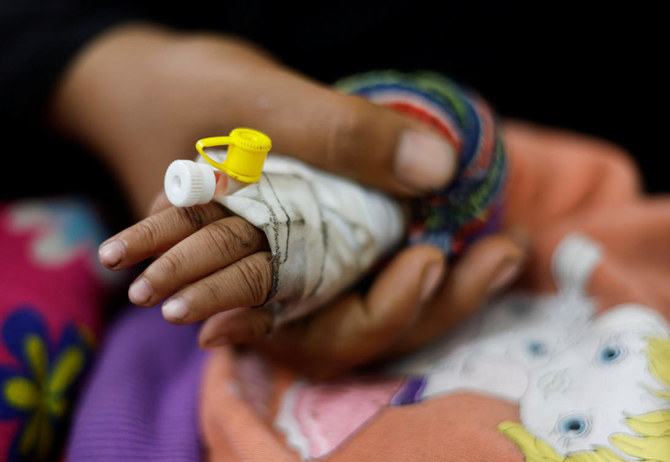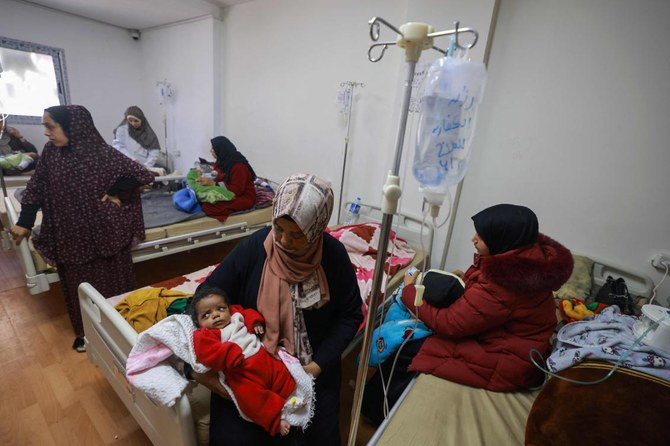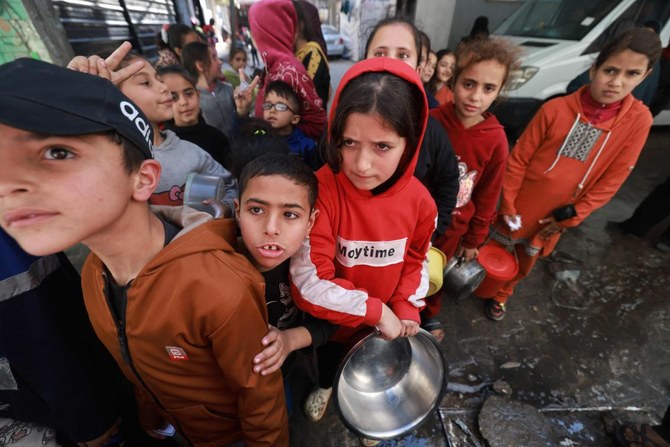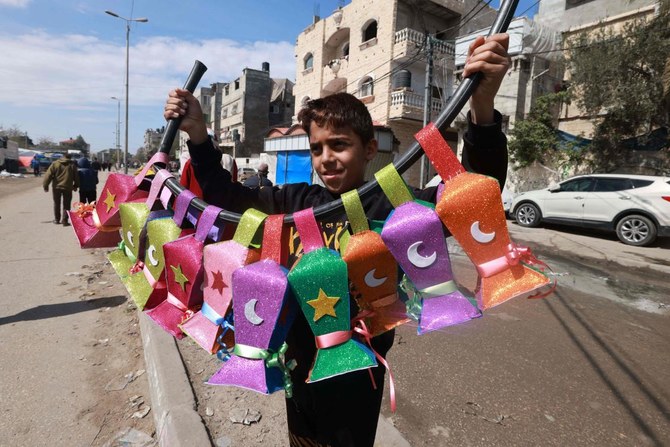GAZA STRIP, Palestinian Territories: For Muslims worldwide, Ramadan is a time of prayer, reflection and joyful evening meals, but all Gazans wish for this year is an end to five months of war and suffering.
It is a hope shared widely across the Islamic world, where the thoughts of many are with Gaza ahead of the fasting month which starts with the sighting of the crescent moon on Sunday or Monday.
The war sparked by Hamas’s October 7 attack against Israel has devastated Gaza, killed tens of thousands of Palestinians and triggered violence elsewhere in the Middle East, from Lebanon to the seas off Yemen.
Amid the ruins of southern Gaza, Nevin Al-Siksek sat recently outside her makeshift tent, distracting her young daughter from the carnage around them with a plastic Ramadan lantern.
The colorful fanous lanterns are an iconic symbol of Ramadan, the ninth month of the Islamic calendar marked by dawn-to-dusk fasting and, in better times, festive evening iftar meals with family and friends.
Across Gaza this year, the lights are among the few signs signalling the coming holy month, amid dire warnings of mass starvation.
While international mediators were hoping for a truce in time for Ramadan, no breakthrough had come by Friday.
Much of the territory of 2.4 million people has become a hellscape of bombed-out neighborhoods, emaciated children and mass graves dug in the sand.
Siksek and her family, instead of tucking into lamb and sweets at the home they had to flee in northern Gaza, will break their fast in the bare-bones tent they share with other displaced civilians.
If they can find anything to eat, that is.
“We do not have any food to prepare,” Siksek said as her husband, Mohammed Yasser Rayhan, nodded in agreement.
In the past during Ramadan, which commemorates the beginning of the Qur'anic revelation to the Prophet Muhammad in the seventh century, “there was life, joy, spirit, decorations and a beautiful atmosphere,” Rayhan said.
“Now Ramadan is coming and we have war, oppression and famine.”
The Gaza war erupted after Hamas staged an unprecedented attack on southern Israel that resulted in the deaths of around 1,160 people, mostly civilians, according to an AFP tally based on official Israeli figures.
Israel’s retaliatory military campaign has killed at least 30,800 people so far, the vast majority women and children, according to Hamas-run Gaza’s health ministry.
Other parts of the Islamic world may be grappling with their own challenges, from conflicts to high inflation. But many Muslims say their thoughts are with Palestinians this year.
“Every time I pray, I always send a prayer for our brothers and sisters in the Palestinian territory,” said Indonesian housewife Nurunnisa, 61, in Aceh province in the west of the country with the world’s largest Muslim population.
“I can’t help them with anything so I can only help them with prayer. I pray the war will be over soon. The people there are suffering so much.”
The reports of looming famine in Gaza, where desperate residents have taken to eating slaughtered horses and even leaves, also weigh heavily on Jordanian father-of-five Saif Hindawi, he said as he shopped for rice and oil in Amman.
“Imagine in Jordan, there are high prices, but there is still the ability to buy what is available,” said the 44-year-old.
In Gaza, he said, “they have used animal fodder to make bread.”
The war has had a severe impact on southern Lebanon, where Iran-backed Hezbollah militants have exchanged near-daily strikes with Israel and tens of thousands have been displaced on both sides of the border.
Retired teacher Maryam Awada, now living in a school-turned-shelter in the city of Tyre, said she would be unable to fast this Ramadan because of the stress.
“God will not force me to fast here in this hall we’re living in,” she said.
In Yemen, Iran-backed Houthi rebels began firing missiles at vessels linked to Israel in November.
The Houthis’ campaign has won them fans abroad, but within Yemen it has worsened a humanitarian crisis brought on by a nearly decade-long civil war.
In the port city of Hodeida, an area targeted by anti-Houthi US strikes, restaurant manager Ali Mohammad said he was bracing for a lean month.
“When the air strikes began, business suddenly collapsed,” he said. “If the situation continues... our only option will be to close down.”
In Somalia’s capital, trader Abdirahim Ali said he worried the Red Sea crisis would drive up prices, something that “affects people during Ramadan” especially.
Muslims in Israeli-annexed east Jerusalem worry about violence at the Al-Aqsa mosque compound, a regular flashpoint.
The site is Islam’s third-holiest and Judaism’s most sacred, known to Jews as the Temple Mount.
During Ramadan, Muslims in their tens and even hundreds of thousands pray at the compound’s iconic Dome of the Rock.
But in February, Israel’s hard-right National Security Minister Itamar Ben Gvir argued that Palestinian residents of the occupied West Bank “should not be allowed” entry to Jerusalem during Ramadan.
Prime Minister Benjamin Netanyahu’s office said on Tuesday that worshippers would be allowed to enter the mosque “in similar numbers” to past years.
That did little to reassure Ahlam Shaheen, 32, who works at a community center near Al-Aqsa.
When Israeli police stormed the mosque in 2021, Shaheen saw women praying next to her get shot with rubber bullets, and she fears it could happen again.
“We’re living with the war for five months now,” she said. “We’re really tired and drained.”
In Cairo, the most festive of cities during Ramadan, a Gazan student who asked not to be named feared the holy month this year would be unbearable.
“For the first time in my life, I can’t stand the idea of Ramadan,” she said. “It hurts every time I see a fanous,” she said about the lanterns that festoon the city’s streets.
“My brothers and sisters can’t even eat once a day, and we’re supposed to have a fast-breaking meal like everything is normal?“
‘It hurts’: Gaza war robs Muslim world of Ramadan joy
https://arab.news/mf5vd
‘It hurts’: Gaza war robs Muslim world of Ramadan joy

- Amid the ruins of southern Gaza, Nevin Al-Siksek sat recently outside her makeshift tent, distracting her young daughter from the carnage around them with a plastic Ramadan lantern
- Across Gaza this year, the lights are among the few signs signalling the coming holy month, amid dire warnings of mass starvation
Lebanese PM to visit Syria, discuss disappearance of prisoners

- Nawaf Salam lays wreath at Martyrs’ Monument in Beirut to commemorate 50th anniversary of Lebanese Civil War
LONDON: Lebanon’s Prime Minister Nawaf Salam is scheduled to visit the Syrian Arab Republic on Monday to discuss common interests with the new leadership in Damascus.
It will be Salam’s first visit to Syria since he formed a government in February, and he is scheduled to discuss the issue of Lebanese citizens who disappeared in Syrian prisons during the Bashar Assad regime that collapsed in December. It has been reported that 622 Lebanese nationals remain forcibly disappeared in Syrian prisons.
“I hope to return with good news about those missing in Syria, and I will update the Lebanese people on this issue tomorrow,” Salam said, according to the National News Agency.
Salam laid a wreath at the Martyrs’ Monument in Beirut on Sunday to commemorate the anniversary of April 13, the date when Lebanon’s Civil War began in 1975.
Salam wrote on X: “We pause not to reopen wounds, but to recall lessons that must never be forgotten. All victories were false, and all parties (from the war) emerged as losers.”
He added: “There can be no true state unless legitimate armed forces have the exclusive right to bear arms.”
Aid worker missing after deadly attack on colleagues is held by Israel, ICRC says

- PRCS demanded the immediate release of Nsasrah, who it said was “forcibly abducted” while carrying out humanitarian duties
CAIRO: A Palestinian Red Crescent staff member who went missing in late March when 15 humanitarian workers were killed by Israeli fire is being detained by Israeli authorities, the rescue service and the Red Cross said on Sunday.
Hisham Mhana, the spokesperson for the ICRC in Gaza, confirmed to Reuters that it had received information that the Palestine Red Crescent Society paramedic Assad Al-Nsasrah was being held in an Israeli place of detention.
“As per standard practice, we informed the families immediately. In this case, we also informed the Palestine Red Crescent Society as they have special standing as a partner of the International Red Cross and Red Crescent Movement,” he said.
The Israeli army did not immediately comment.
Mhana said the ICRC has not been granted access to Nsasrah, who until Sunday had been declared missing, and also has not been able to visit any of the Palestinian detainees and prisoners in Israeli jails since October 7, 2023.
In a post on X, The PRCS demanded the immediate release of Nsasrah, who it said was “forcibly abducted” while carrying out humanitarian duties.
It added that Nsasrah and his colleagues came under heavy gunfire, which led to the killing of eight of them in a “grave violation” of international humanitarian law.
The bodies of 15 emergency and aid workers from the Red Crescent, the Civil Emergency Service and the UN were found buried in a mass grave in southern Gaza in March.
The UN and the Red Crescent accused Israeli forces of killing them after they were dispatched to respond to reports of injuries from Israeli airstrikes.
The Israeli military referred Reuters to its statement from Monday, in which it said that a thorough inquiry into the incident was still underway and that it would provide further details only once the investigation is complete.
It said that a preliminary inquiry indicated that “the troops opened fire due to a perceived threat following a previous encounter in the area, and that six of the individuals killed in the incident were identified as Hamas terrorists.”
The Israeli military has provided no evidence of how it determined that the six were Hamas militants, and the Islamist faction has rejected the accusation.
The only known survivor of the incident, PRCS paramedic Munther Abed, said soldiers had opened fire on clearly marked emergency response vehicles.
Moroccans demonstrate in support of Palestinians

- Demonstrators marched through the streets of Rabat under pouring rain in response to a call from the National Action Group for Palestine
RABAT: Several thousand people demonstrated in Morocco’s capital on Sunday to show support for Palestinians in war-torn Gaza.
Under pouring rain, demonstrators marched through the streets of Rabat in response to a call from the National Action Group for Palestine, a coalition of several political organizations, including the Islamist Justice and Development Party (PJD).
“The Moroccans are with Gaza,” said the principal of a private school in Rabat who spoke to AFP.
The North African kingdom has officially called for “the immediate, complete and permanent halt to the Israeli war on Gaza,” but has not publicly discussed reversing the official establishment of ties with Israel in 2020 as part of the US-led Abraham Accords.
The latest protest followed another large rally held a week earlier, part of a spate of demonstrations across the country since the Israeli army resumed its offensive on March 18 against the Islamist group Hamas after a two-month truce in Gaza.
Israel denies entry to Jerusalem for Palestinian Christians marking Palm Sunday

- Israeli restrictions at checkpoints around Jerusalem require Palestinians to obtain security permits to access religious sites
- Only 6,000 permits were issued this year to the West Bank’s 50,000 Christians
LONDON: Israeli authorities prevented Palestinian Christian worshippers from entering Jerusalem from the occupied West Bank to participate in Palm Sunday.
Israeli authorities imposed strict restrictions on Jerusalem over the weekend, limiting the access of Palestinian Christians to the city, the Wafa news agency reported.
Only a limited number of worshippers, primarily residents of Jerusalem and Palestinian citizens of Israel, were able to attend religious services at Jerusalem’s Church of the Holy Sepulchre, Wafa added.
Palm Sunday marks the beginning of Holy Week leading up to Easter. It commemorates the entry of Jesus Christ into Jerusalem and is observed by Eastern and Western Christian churches.
On Sunday, Patriarch Theophilos III of the Greek Orthodox Church and Latin Patriarch Cardinal Pierbattista Pizzaballa led liturgies attended by the clergy and a small group of worshipers.
Israeli restrictions at checkpoints around Jerusalem require Palestinians — Muslim and Christian — to obtain permits to access religious sites, including the Al-Aqsa Mosque and the Church of the Holy Sepulchre.
Father Ibrahim Faltas, Vicar of the Custody of the Holy Land, noted that only 6,000 permits were issued this year to the West Bank’s 50,000 Christians. Permit issuance requires a security clearance and often asks that applicants download a mobile application managed by Israeli authorities.
“This is the second consecutive year that only a small number of pilgrims are able to participate in Holy Week and Easter celebrations in Jerusalem due to the ongoing conflict (in Gaza),” Faltas told Wafa.
“Churches would continue to pray for peace, justice, and freedom for all people in the Holy Land,” he added.
The Catholic Palm Sunday procession took place on Sunday afternoon, starting from Jerusalem's Church of Bethphage and ending at the Church of Saint Anne.
Christians gathered for services at the Holy Family Catholic Church and Saint Porphyrius Greek Orthodox Church in the Gaza Strip amid the ongoing Israeli attacks since late 2023. In the West Bank, Palm Sunday services were held in churches throughout Bethlehem, Jericho, Ramallah, Nablus, and Jenin.
Syrian President Sharaa heads to UAE on official visit - SANA

CAIRO: Syrian President Ahmed al-Sharaa will travel to the United Arab Emirates for his second visit to a Gulf state as president on Sunday, Syria's official news agency reported.
He will be accompanied by foreign minister Assad al-Shibani, who visited the UAE earlier this year.
They are expected to discuss issues of mutual interest, the SANA state news agency reported.
Sharaa visited Saudi Arabia in February on his first foreign trip since assuming the presidency in January.
His visit to the UAE comes as the new Syrian leadership attempts to strengthen ties with Arab and Western leaders following the fall of Bashar al-Assad in December at the hands of Sharaa's Sunni Islamist group, Hayat Tahrir al-Sham.
(With Reuters)

























